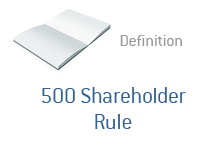Definition of 500 Shareholder Rule
What is the 500 shareholder rule? What is meant by the 500 shareholder rule?
If you have been following the Facebook initial public offering at all, there is probably a good chance that you have heard that the reason why Facebook went public when they did is because of the "500 shareholder rule".
The "500 shareholder rule" refers to a SEC (Securities and Exchange Commission) rule that requires companies with more than 500 shareholders to register with the SEC. Not only does this incur significant costs for the company, but it also forces them to publicly disclose their financial information. At this point, many companies figure that since they are already disclosing their financial information to the public, they may as well sell shares to the public as well.
 A number of notable companies, including Google and Zynga, have reportedly taken their companies public due to the "500 shareholder rule".
A number of notable companies, including Google and Zynga, have reportedly taken their companies public due to the "500 shareholder rule". Thanks to secondary markets, popular companies such as Facebook can acquire 500 shareholders pretty quickly. For instance, if an employer of the company decides to sell some of their shares to a company like Elevation Partners, a new shareholder has just been added to the rolls. This is exactly what happened with Facebook thanks to a healthy demand for shares in the secondary markets.
There has been talk of changing the "500 shareholder" rule to a "2,000 shareholder" rule, but such legislation has not been enacted as of yet.
--
Davemanuel.com Articles That Mention 500 Shareholder Rule:
None
